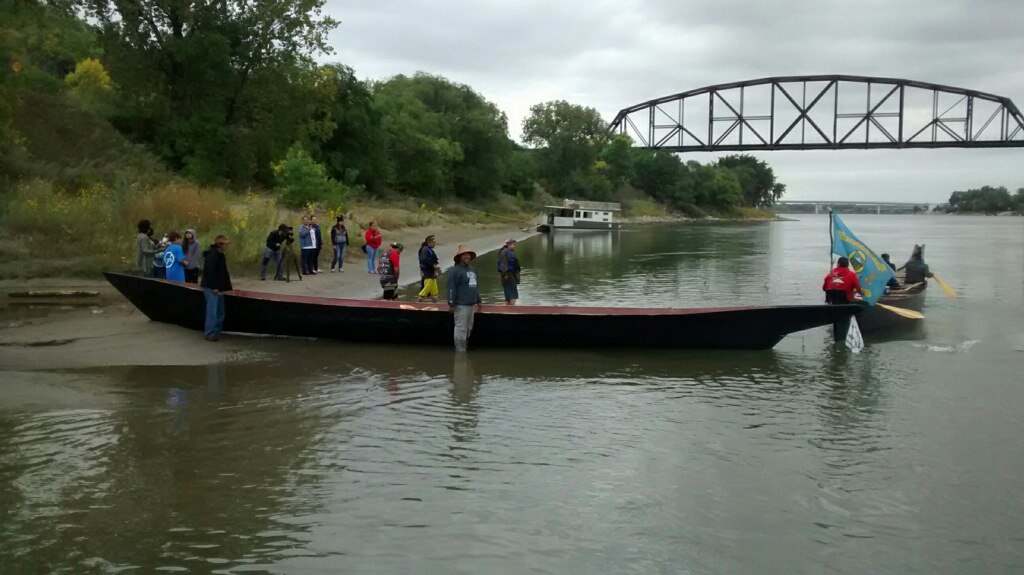While the Quinault Indian Nation fights its own battle against an oil transportation facility in Grays Harbor County, it is also sending support to another tribe embroiled in a similar, if more volatile protest of their own in North Dakota.
The Standing Rock Sioux’s fight against the construction of an oil pipeline they say is damaging culturally significant lands and could pollute area waters also brings light to the larger issue of the relationship between federal and tribal governments, according to Quinault Nation President Fawn Sharp.
“The situation at Standing Rock is a prime example of the need to fundamentally change relationships between the United States and tribal nations,” wrote Sharp in a statement announcing the letters she sent to U.S. officials Wednesday in support of the Standing Rock protest.
She continued, “The United States has a responsibility and duty to honor our treaties, which are part of the supreme law of the land under the Constitution and to work with us on a government-to-government basis. That responsibility includes protection from the types of out-of-control, militaristic actions being taken against peaceful protesters in North Dakota.”
Sharp is speaking of the protests taking place on property in the path of the pipeline, a 1,172-mile conduit for oil leaving the oil fields of North Dakota on its way to southern Illinois being constructed by Texas-based Energy Transfer Partners. The protests, violent at times, have garnered quite a following thanks to hundreds of posts on social media, the majority in support of the Standing Rock Sioux Tribe.
“The Quinault Nation stands in solidarity with the Standing Rock Sioux Tribe,” said President Sharp. “The protesters are seeking to prevent catastrophic damage to water and cultural resources and the right to be consulted and engage in meaningful dialogue before irreparable harm occurs.”
While pipeline construction does not cross official reservation property, it passes within a half mile from its border and nearby Lake Oahe, and the pipeline itself will cut under the Missouri River, prompting water quality concerns from the tribe along with worries of damage to land they claim is of historical significance.
According to a statement by the Morton County N.D.’s Sheriff’s Office dated Nov. 3, “Authorities have made 416 arrests for crimes related to illegal protest activities since Aug. 10 in Morton County. Only 8.4 percent of those arrested are from North Dakota. Individuals arrested are from 43 states, D.C. and Canada.”
Among the protesters are Hollywood celebrities and presidential candidates; the former, actress Shailene Woodley, and the latter, Dr. Jill Stein, have both been arrested for their part in the protests. A particularly violent clash took place Oct. 27, when the Sheriff’s Office posted a video to social media allegedly showing protesters throwing Molotov cocktail-type incendiary devices at authorities. More than 100 people were arrested. Sharp speaks of the “the arrests, the gassing, the clubbing” of protesters. “The presence of the National Guard has escalated violence and put human safety at risk.”
The letters from the Quinault Tribe were addressed to Gov. Jack Dalrymple and Lt. Gov. Drew Wrigley of North Dakota, United States Attorney General Loretta Lynch and Assistant Secretary of the Army Jo-Ellen Darcy in support of “water protectors” opposing the pipeline, said Sharp.
Standing Rock has sued several times to have construction halted and been unsuccessful each time, most recently Oct. 9 when a federal district court rejected the tribe’s call for a permanent injunction on the construction. The next day the U.S. Departments of Justice, the Interior, and Army issue a joint statement saying, in part, “The Army will not authorize constructing the Dakota Access pipeline on Corps land bordering or under Lake Oahe until it can determine whether it will need to reconsider any of its previous decisions regarding the Lake Oahe site under the National Environmental Policy Act (NEPA) or other federal laws. Therefore, construction of the pipeline on Army Corps land bordering or under Lake Oahe will not go forward at this time.” However, legally all that could be done was to ask the pipeline company to halt construction voluntarily. They refused, and construction continued.
The Quinault letters, sent to each individual separately, gave Sharp the opportunity to again stress the importance of the Obama administration to meet formally. “A true dialogue between sovereign nations is an absolute necessity,” she said. “Quinault formally requested a government-to-government discussion on our proposed framework with the Obama Administration three years ago. We are still awaiting their response.”
Construction continues, with the pipeline company getting approval for each permit they apply for and federal courts deciding in their favor. The protests continue as well, and it appears not even the brutal cold of an approaching North Dakota winter will cool the Standing Rock Sioux and their supporters’ resolve.
The Quinault Tribe’s letters are just the most recent shows of support the tribe has given to Standing Rock protesters. In September members of the Quinault Nation piloted their Grandfather Canoe down the Missouri River, joining members of other tribes from across the nation in a show of solidarity for treaty rights and the protest itself.


